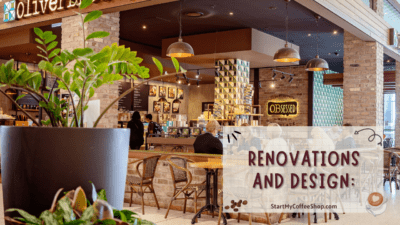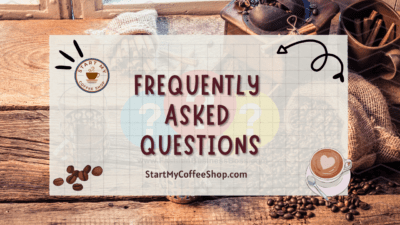If you’ve ever dreamed of opening your coffee bar, you’ve likely wondered about the financial investment required to turn that dream into a reality. From cozy neighborhood cafés to trendy espresso bars, the cost of opening a coffee bar can vary greatly depending on several factors.
Startup costs for a coffee bar can vary widely depending on factors such as location, size, equipment, renovations, permits, and staffing. Generally, the estimated range can be anywhere from $50,000 to $500,000 or more.
And in this article, I will delve into the intricacies of budgeting for your caffeine haven, exploring key expenses and considerations along the way.
Location:
Urban areas, suburban neighborhoods, and tourist hotspots each present distinct advantages and challenges. Urban areas often offer higher foot traffic and a diverse customer base but may come with exorbitant rent prices. Suburban neighborhoods, on the other hand, might have lower rental costs but may require more effort to attract customers.
To make an informed decision, thorough market research is indispensable. Study the demographics of the area, including the population size, age groups, and income levels. Understanding the preferences and habits of the local population will help you tailor your offerings to their tastes and needs. Additionally, assess the competition in the vicinity. Identify existing coffee shops and analyze their strengths and weaknesses. This analysis will allow you to identify gaps in the market and position your coffee bar uniquely.
Consider the accessibility of the location as well. Is it conveniently located near public transportation or major thoroughfares? Is there ample parking available? These factors can greatly impact the ease with which customers can visit your establishment.
Furthermore, evaluate the visibility and potential for brand exposure that a particular location offers. High-traffic areas, such as shopping centers or busy streets, provide greater opportunities for attracting customers. Balancing the rent costs with the potential for increased foot traffic and visibility is crucial in selecting an optimal location for your coffee bar.
By conducting thorough market research, analyzing demographics, assessing competition, and considering factors like accessibility and visibility, you can make an informed decision about the best location for your coffee bar.
Equipment and Furnishings:
Equipping your coffee bar with the necessary tools and equipment is a significant expense that should not be overlooked. The quality and reliability of your equipment directly impact the taste and consistency of the beverages you serve, as well as the overall efficiency of your operations.
Here are some key considerations when budgeting for equipment:
- Espresso Machines: The centerpiece of any coffee bar, an espresso machine is a crucial investment. The cost of espresso machines can vary widely depending on the brand, features, and capabilities. High-quality machines often come with a higher price tag, but they offer better temperature control, extraction precision, and durability, ensuring the delivery of consistently excellent espresso shots.
- Grinders: To achieve the perfect grind consistency and freshness, investing in quality coffee grinders is essential. Grinders are available in various price ranges, and it’s advisable to choose one that meets your specific needs and budget. Consider factors such as burr size, grind settings, and durability when making your selection.
- Brewers and Blenders: Depending on your menu offerings, you may require additional brewing equipment for drip coffee, pour-over, or cold brew. Additionally, if you plan to serve blended drinks, investing in high-performance blenders is necessary to achieve smooth and consistent results.
- Refrigeration and Storage: Proper refrigeration is crucial for storing milk, cream, syrups, and perishable food items. Investing in commercial-grade refrigerators and freezers ensures food safety and quality. Adequate storage solutions such as shelves, cabinets, and storage containers should also be budgeted for.
- Seating, Tables, and Décor: Creating a comfortable and inviting atmosphere is essential for attracting and retaining customers. Allocate funds for ergonomic seating, durable tables, and stylish décor elements that align with your coffee bar’s theme or style. These elements contribute to the overall ambiance and customer experience.
Remember to consider maintenance and warranty costs when budgeting for equipment. Regular maintenance and proper care will prolong the lifespan of your equipment and ensure optimal performance.
Renovations and Design:

Creating a welcoming coffee haven often involves transforming space through renovations and interior design work. The costs associated with these endeavors will depend on the condition of the chosen location and the extent of changes desired.
Renovations may include plumbing, electrical work, flooring, painting, lighting, and sound systems. Collaborating with experienced professionals, such as a contractor and interior designers, can help you create a unique and functional space that reflects your brand identity while staying within your budget.
Assessing the existing condition of the location is the first step. Determine if any structural changes or repairs are necessary to ensure the safety and functionality of the space. This may involve working with a contractor who specializes in commercial renovations. They can provide expert guidance on the scope of the renovations and estimate the associated costs.
Interior design plays a crucial role in creating an atmosphere that aligns with your coffee bar’s concept and target audience. Working with an experienced interior designer can help you optimize the layout, select appropriate finishes, and design a visually appealing space. They can also suggest cost-effective solutions without compromising on style and functionality.
Considerations such as seating arrangements, traffic flow, and the placement of the counter and brewing equipment are essential for creating an efficient and comfortable space. Lighting and sound systems are also key elements that can enhance the ambiance and create a cozy atmosphere for customers.
While renovations and interior design work can be significant expenses, it’s important to strike a balance between the desired changes and your budget. Prioritize the essential aspects that will have the most impact on customer experience and allocate your resources accordingly. Additionally, obtaining multiple quotes from contractors and sourcing materials from reliable suppliers can help you manage costs effectively.
Remember that the goal is to create a space that not only reflects your brand identity but also provides a warm and inviting environment for customers to enjoy their coffee. With careful planning, attention to detail, and the right team of professionals, you can transform a space into a coffee haven that leaves a lasting impression on your customers.
Read more about Cost to Open Coffee Shop Average: From Concept to Cash Register
Permits, Licenses, and Legalities:
Operating a coffee bar comes with the responsibility of adhering to legal requirements and obtaining the appropriate permits and licenses. These may include business licenses, health permits, food handling certifications, and potentially alcohol licenses if you intend to serve alcoholic beverages. The costs associated with these permits and licenses can vary based on local regulations and the jurisdiction in which you operate. To ensure a smooth and lawful operation, it is crucial to thoroughly research and comply with all relevant laws and regulations.
Business licenses are typically the first step in establishing your coffee bar. The cost of a business license depends on factors such as your location and the type of business entity you establish. It is advisable to contact your local government or licensing department to gather information on specific requirements and associated fees.
Health permits are necessary for coffee bars that handle and serve food and beverages. These permits confirm that your establishment meets health and sanitation regulations to ensure the well-being of your customers. The cost of health permits can vary depending on the size of your coffee bar, the nature of food preparation involved, and the requirements of the local health department.
In some jurisdictions, food handlers are required to undergo training and obtain certifications in safe food handling practices. These certifications demonstrate your commitment to maintaining proper food hygiene and minimizing the risk of foodborne illnesses. The cost of food handling certifications varies depending on the program and provider you choose.
If you plan to serve alcoholic beverages, additional permits or licenses may be necessary. The cost of alcohol licenses can vary widely based on factors such as your location and the specific type of license required.
Staffing and Training:
Allocating funds for recruitment, training, and wages is essential to build a skilled and friendly workforce. Baristas, cashiers, kitchen staff, and managers all contribute to the seamless operation of your coffee bar.
Recruiting and hiring the right individuals who embody your coffee bar’s values and have a passion for coffee and customer service is paramount. Consider the qualifications, experience, and personality traits necessary for each role, and allocate resources to attract top talent.
Investing in thorough training programs is key to ensuring consistency in drink quality, customer engagement, and overall operations. Baristas should be trained in the art of espresso preparation, latte art, and understanding different coffee profiles.
Cashiers should receive training in effective order-taking and transaction management, while kitchen staff should be equipped with food handling and preparation knowledge. Managers should receive comprehensive training in leadership, team management, and administrative tasks.
Additionally, ongoing training and professional development opportunities are essential to keep your team motivated, up-to-date with industry trends, and equipped with new skills. This can include workshops, seminars, or online courses that enhance their knowledge of coffee, customer service, and managerial skills.
It is important to budget for competitive wages to attract and retain skilled staff. Providing fair compensation and potential incentives or benefits can boost employee satisfaction and create a positive work environment.
Remember, a well-trained and motivated team is the backbone of your coffee bar. They not only provide excellent customer service but also contribute to the overall atmosphere and progress of your establishment. By allocating resources for recruitment, training, and competitive wages, you can build a strong team that will help elevate your coffee bar to new heights.
Marketing and Branding:
To attract customers and generate a buzz around your coffee bar, it is crucial to allocate a portion of your budget to marketing and branding efforts. These efforts are essential for establishing your presence in the market and building a loyal customer base.
Here are some key considerations for effective marketing and branding:

- Designing a Compelling Logo: A well-designed logo serves as the face of your coffee bar. It should be visually appealing, memorable, and representative of your brand identity. A professional graphic designer can help create a logo that captures the essence of your coffee bar and resonates with your target audience.
- Establishing a Strong Online Presence: In today’s digital age, having a robust online presence is vital. Invest in creating a user-friendly website that showcases your offerings, provides essential information, and enables online ordering if applicable. Additionally, leverage social media platforms like Facebook, Instagram, and Twitter to engage with your audience, share updates, and showcase your coffee bar’s unique aspects.
- Marketing Strategies: Promotions, advertising, and community engagement are valuable marketing strategies to consider. Offering special promotions, such as discounted coffee during specific hours or loyalty programs, can attract new customers and encourage repeat visits. Advertising through local publications, online platforms, or even radio can help increase visibility. Engaging with the community through sponsorships, partnerships, or participating in local events can foster goodwill and create positive associations with your coffee bar.
- Brand Identity: Developing a well-defined brand identity is crucial for differentiation. It encompasses your coffee bar’s values, personality, and unique selling points. Consider the atmosphere, decor, and customer experience you want to create. Align your messaging, visuals, and overall brand voice to reflect this identity consistently across all touchpoints, from signage to packaging to social media posts. This cohesive branding will help customers recognize and remember your coffee bar.
Read more about Cost to Open Coffee Stand: Evaluating the Financial Commitment to a Coffee Stand
Summary
Opening a coffee bar requires careful financial planning and budgeting. From securing the ideal location and investing in quality equipment to navigating legal requirements and building a strong brand, each aspect comes with its own set of costs. By conducting thorough research, seeking professional advice, and creating a detailed business plan, you can gain a better understanding of the estimated expenses involved.
Frequently Asked Questions

What permits and licenses are required to open a coffee bar?
Generally, you will need business licenses, health permits, food handling certifications, and possibly alcohol licenses if you plan to serve alcoholic beverages.
How important is the location of the coffee bar?
A prime location with high foot traffic and visibility can greatly impact the number of customers and overall revenue.
What are the ongoing expenses of running a coffee bar?
Running a coffee bar involves various ongoing expenses, including rent or mortgage payments, utilities (electricity, water, gas), inventory (coffee beans, milk, syrups, food items), wages for employees, marketing and advertising costs, equipment maintenance, and insurance.
To learn more on how to start your own coffee shop checkout my startup documents here
Please note: This blog post is for educational purposes only and does not constitute legal advice. Please consult a legal expert to address your specific needs.

Hi! I’m Shawn Chun
My adventure in coffee began when I first launched my first coffee shop back in the early 2000s. I had to figure out so many things on my own and to make it worse within 2 years of opening two large corporate coffee chains moved in just blocks away from me!
As I saw smaller and even some larger coffee shops in the neighborhood slowly lose customers to these giant coffee chains and slowly close up shop, I knew that I had to start getting creative…or go out of business.
I (like you may be) knew the coffee industry well. I could make the best latte art around and the foam on my caps was the fluffiest you have ever seen. I even had the best state-of-the-art 2 group digital Nuova Simonelli machine money could buy. But I knew that these things alone would not be enough to lure customers away from the name brand established coffee shops.
Eventually, through lots of trial and error as well as perseverance and creativity I did find a way to not only survive but also thrive in the coffee/espresso industry even while those corporate coffee chains stayed put. During those years I learned to adapt and always faced new challenges. It was not always easy, however, in the end, I was the sole survivor independent coffee shop within a 10-mile radius of my location. Just two corporate coffee chains and I were left after that year. All told the corporate coffee chains took down over 15 small independent coffee shops and kiosks and I was the last one standing and thriving.
Along the years I meet others with the same passion for coffee and I quickly learned that it is not only “how good a barista is” that makes a coffee shop successful, but the business side of coffee as well.
Hence why I started this website you are on now. To provide the tools and resources for up and coming coffee shop owners to gain that vital insight and knowledge on how to start a coffee shop successfully.
Stick around, browse through my helpful blog and resources and enjoy your stay! With lots of LATTE LOVE!
Shawn







